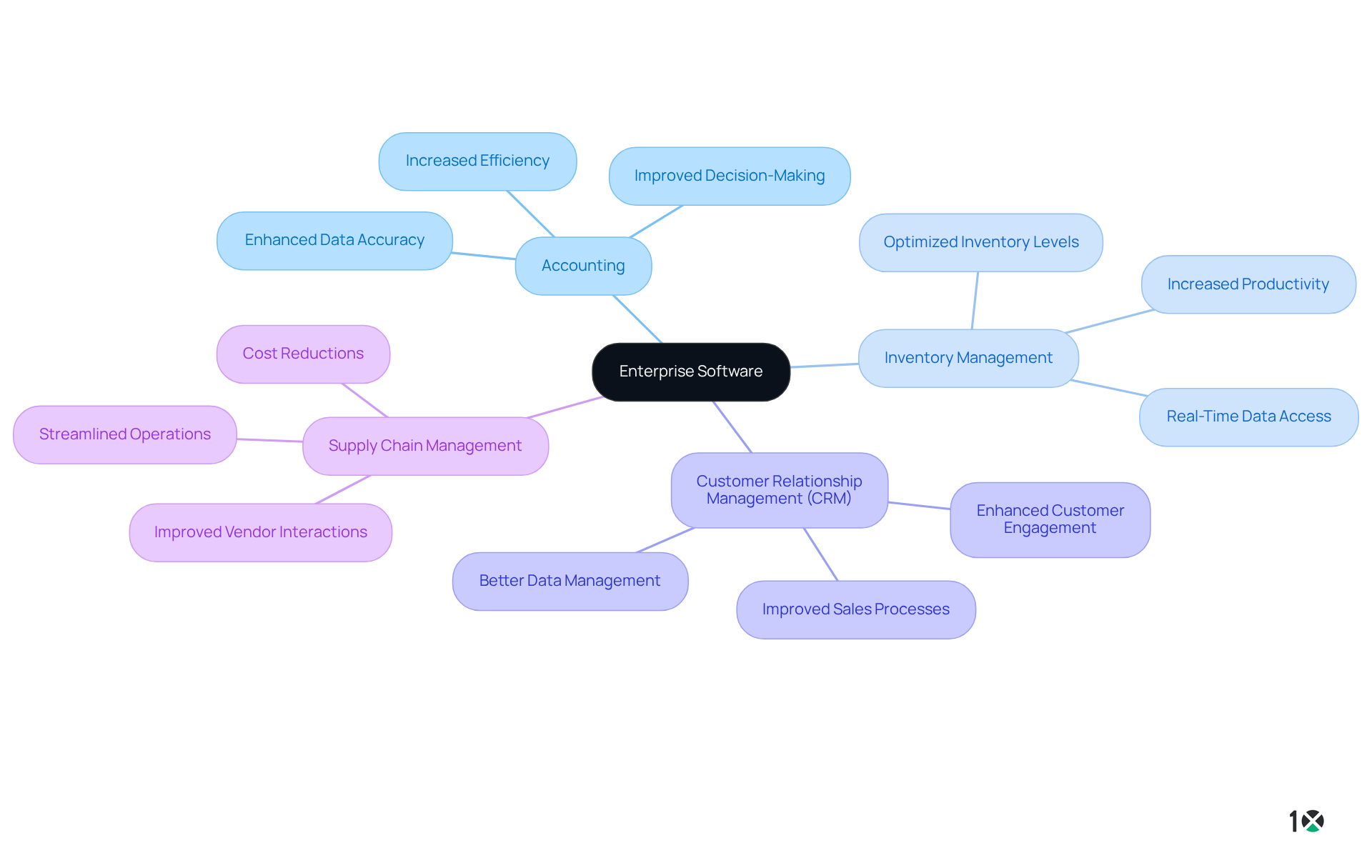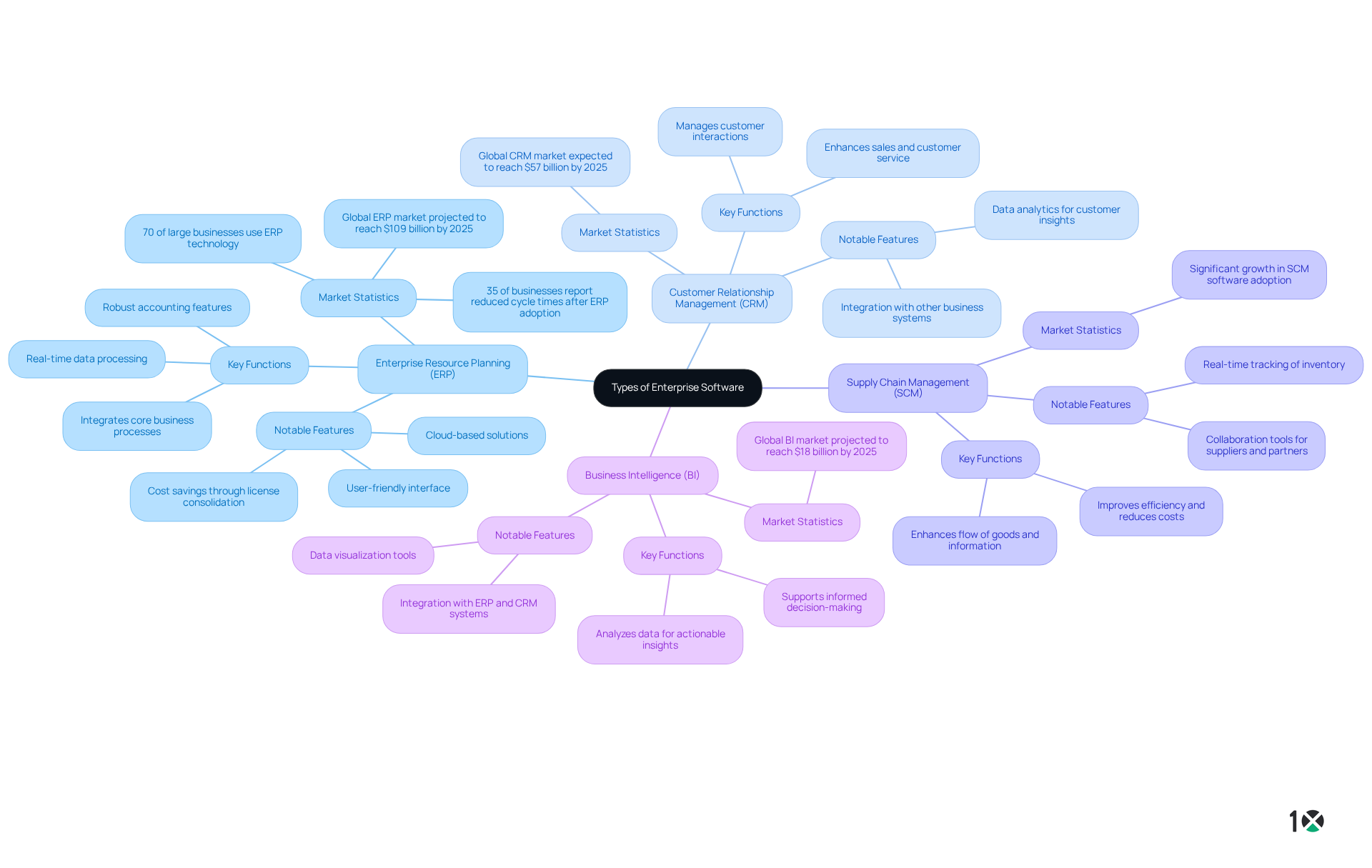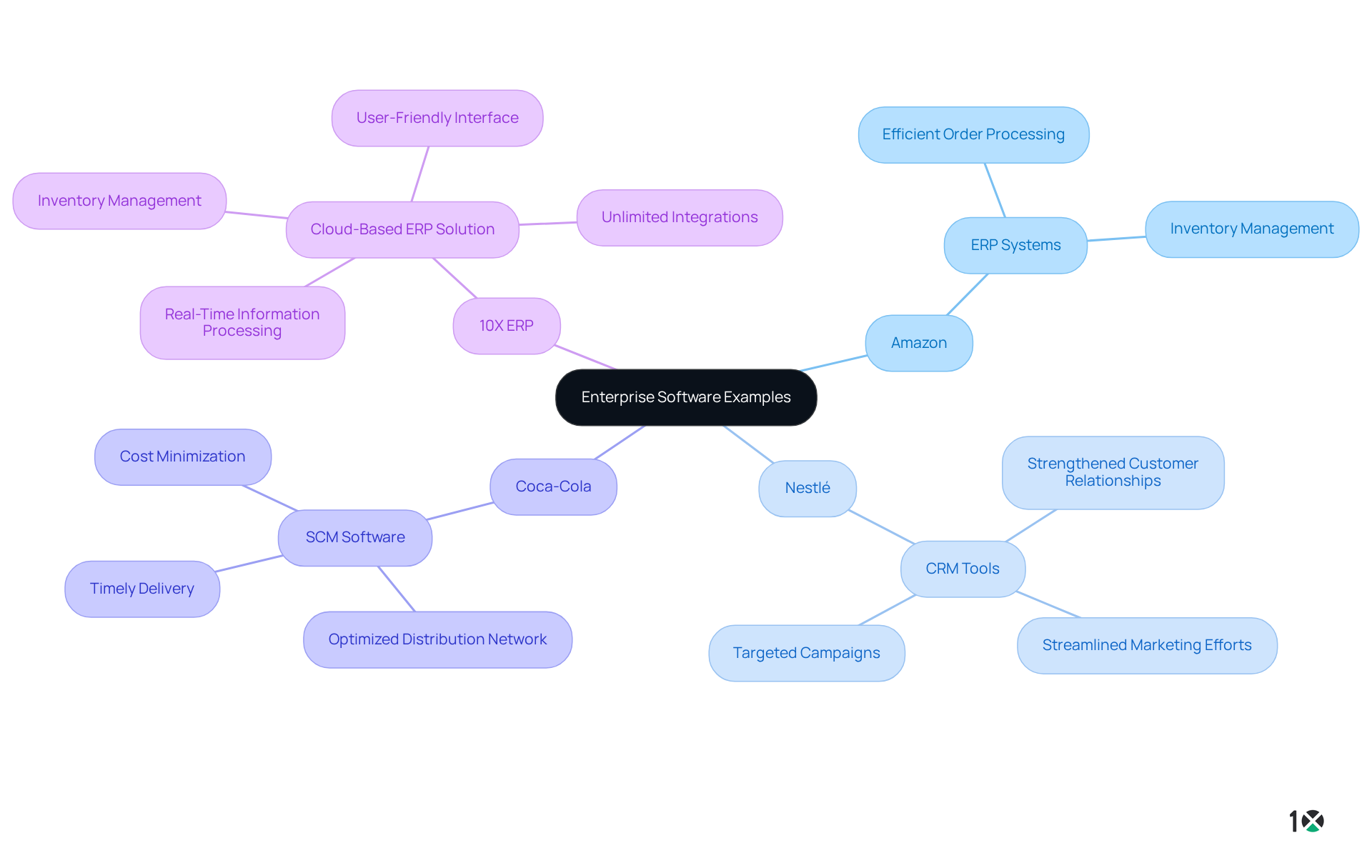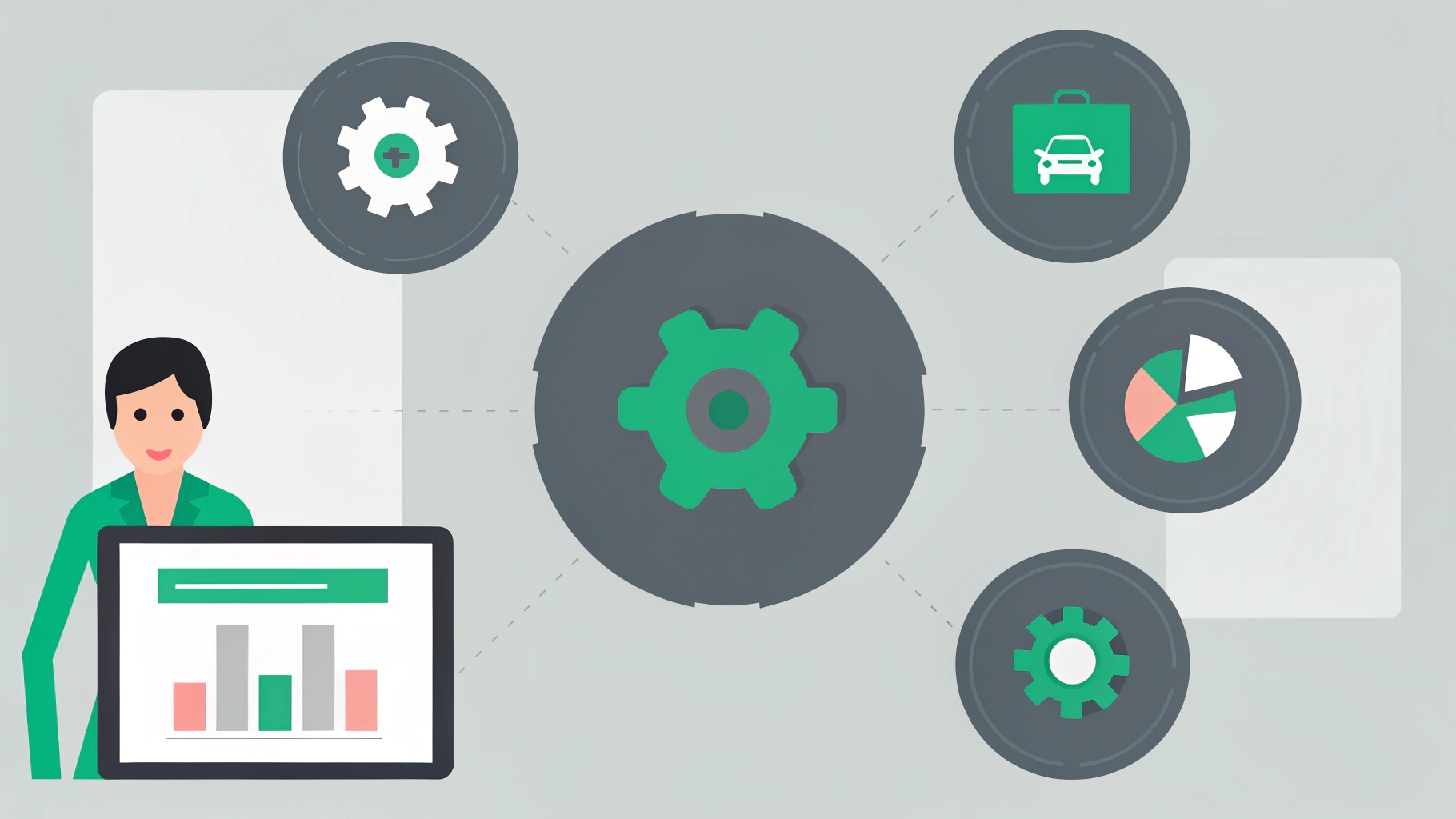Overview
Enterprise software, specifically designed for large organizations, integrates essential functions such as accounting, inventory management, and customer relationship management. This integration streamlines operations and enhances decision-making for distributors, paving the way for significant improvements in efficiency and profitability. Implementing such software is not merely a choice; it is a strategic move that can transform operational dynamics.
Statistics reveal that organizations adopting these systems experience notable enhancements in productivity and operational coherence. These improvements are not just theoretical; they are backed by data-driven insights that underscore the effectiveness of enterprise software. For operations managers facing challenges in maintaining efficiency, the adoption of these systems could be the key to unlocking new levels of success.
In conclusion, the implementation of enterprise software stands as a compelling recommendation for organizations aiming to thrive in a competitive landscape. The benefits are clear, and the evidence is compelling—now is the time to take action and embrace the advantages that such technology offers.
Introduction
Understanding the intricacies of enterprise software is crucial for distributors navigating the complexities of modern business operations. These specialized applications not only integrate essential functions—such as inventory management and customer relationship management—but also enhance efficiency and decision-making capabilities, ultimately driving profitability. Yet, with a staggering 50% of ERP implementations failing initially, a pressing question emerges: how can distributors ensure they harness the full potential of enterprise software to thrive in a competitive landscape?
Define Enterprise Software and Its Importance
What is enterprise software refers to , or enterprise application solutions (EAS), which are specifically designed to address the complex needs of large organizations. Unlike consumer applications that cater to individual users, enterprise solutions integrate various functions across a company, such as:
- Accounting
- Inventory management
- Customer relationship management (CRM)
- Supply chain management
For distributors, the importance of enterprise solutions is paramount; they streamline operations, enhance data accuracy, and significantly improve decision-making capabilities. This leads to increased efficiency and profitability, with 78% of organizations reporting heightened productivity following ERP implementation.
Real-world examples illustrate the transformative impact of enterprise applications. Companies that adopted ERP systems, for instance, experienced a remarkable 91% improvement in inventory optimization, highlighting how integrated solutions can refine business processes. Additionally, 74.3% of the benefits from ERP systems manifest as product and efficiency improvements, showcasing the tangible advantages these technologies offer.
In the realm of large organizations, what is enterprise software is essential for fostering collaboration and ensuring seamless communication across departments. By dismantling silos, 77% of organizations have reported improved operational coherence after ERP adoption. The ability to access real-time data empowers stakeholders to make informed decisions swiftly, a necessity in today’s fast-paced business environment. Ultimately, understanding what is enterprise software is a strategic initiative for distributors aiming to enhance their operational efficiency and drive growth.

Explore Types of Enterprise Software and Their Functions
What is enterprise software encompasses several categories of applications, each serving distinct functions within an organization. Key types include:
- Enterprise Resource Planning (ERP): This software integrates core business processes, offering a unified system for managing operations, finance, and human resources. With 70% of large businesses utilizing , it is essential for maintaining competitiveness and streamlining operations. A modern solution like 10X ERP stands out as a 100% cloud-based platform that provides real-time data processing and robust accounting features. This allows distributors to manage inventory effectively and know exactly where their stock is at any time. Furthermore, transitioning to an ERP provides the opportunity to achieve significant savings through the consolidation of licenses. With 10X ERP’s extensive support and user-friendly interface, users can expect a more seamless implementation process relative to rivals.
- Customer Relationship Management (CRM): Focused on managing a company’s interactions with current and potential customers, CRM systems enhance sales and customer service. The global CRM system market is expected to attain 57 billion USD by 2025, indicating its increasing significance in business strategy.
- Supply Chain Management (SCM): SCM applications enhance the flow of goods, information, and finances as products transition from supplier to manufacturer to wholesaler to retailer. This integration is crucial for improving efficiency and reducing costs across the supply chain.
- Business Intelligence (BI): BI tools analyze data to provide actionable insights, enabling organizations to make informed decisions. The global BI and analytics market is anticipated to reach 18 billion USD by 2025, emphasizing the growing dependence on data-driven strategies.
Every category of application, particularly what is enterprise software, plays a crucial role in enhancing operational efficiency, ensuring that distributors can respond swiftly to market demands. For instance, 35% of businesses report reduced cycle times after adopting ERP technology, showcasing its impact on operational speed and effectiveness. However, it is important to note that 65% of businesses find accessing their ERP data difficult, which can hinder decision-making processes. With 10X ERP’s intuitive interface and comprehensive support, users can overcome these challenges, ensuring a smoother experience and better decision-making capabilities.

Examine Real-World Examples of Enterprise Software
Many entities have effectively adopted enterprise applications to enhance their operations. For instance, Amazon utilizes advanced ERP systems to manage its extensive supply chain, ensuring efficient order processing and inventory management. This integration allows Amazon to maintain a competitive edge, with studies indicating that companies using ERP systems can improve supply chain efficiency by up to 74%.
Nestlé employs CRM tools to strengthen customer relationships and streamline marketing efforts, enabling targeted campaigns that significantly enhance customer satisfaction. Research shows that 75% of organizations report improved compliance and customer engagement after implementing CRM solutions.
Coca-Cola leverages supply chain management (SCM) software to optimize its distribution network, ensuring timely delivery of products while minimizing costs. This strategic use of technology has been linked to a 56.8% reduction in operating costs for businesses that effectively implement SCM systems.
In addition to these examples, 10X ERP stands out as a comprehensive [cloud-based ERP solution](https://10xerp.com) tailored for distributors. With its extensive features, smooth user experience, and , 10X ERP guarantees that businesses can effortlessly manage their operations while benefiting from real-time information processing and inventory management. The platform emphasizes information integrity and security, utilizing premium cloud server hosting and continuous information backup to ensure high availability. Furthermore, its unlimited integrations through modern APIs enhance functionality, allowing distributors to maintain data accuracy and streamline their processes.
These examples illustrate what is enterprise software, as it not only supports daily operations but also drives strategic initiatives, enabling distributors to remain competitive in a rapidly evolving market. However, while many companies experience significant benefits from ERP implementations, challenges persist; for instance, 50% of ERP implementations fail the first time around. This underscores the necessity for careful planning and execution in adopting these systems.

Conclusion
Understanding enterprise software is crucial for distributors aiming to enhance operational efficiency and drive growth. These solutions are not merely tools; they are integral to streamlining processes, improving data accuracy, and facilitating informed decision-making across large organizations. By integrating various business functions—from accounting to supply chain management—enterprise software empowers distributors to operate more cohesively and effectively.
The article highlights several key types of enterprise software, including:
- ERP
- CRM
- SCM
- BI
Each serving unique functions that collectively enhance productivity and responsiveness to market demands. Real-world examples from major companies like Amazon, Nestlé, and Coca-Cola demonstrate the tangible benefits of adopting these technologies, showcasing improvements in efficiency, customer satisfaction, and cost reductions. However, the challenges of implementation also remind us that success requires careful planning and execution.
In a rapidly evolving business landscape, the significance of enterprise software cannot be overstated. Distributors must embrace these solutions to remain competitive and responsive to changing market conditions. By investing in the right technology, organizations can not only streamline their operations but also position themselves for sustained growth and success in the future.
Frequently Asked Questions
What is enterprise software?
Enterprise software, also known as enterprise applications or enterprise application solutions (EAS), refers to applications specifically designed to meet the complex needs of large organizations. It integrates various functions across a company, including accounting, inventory management, customer relationship management (CRM), and supply chain management.
Why is enterprise software important for large organizations?
Enterprise software is crucial for large organizations because it streamlines operations, enhances data accuracy, and significantly improves decision-making capabilities. This leads to increased efficiency and profitability, with many organizations reporting heightened productivity following the implementation of enterprise resource planning (ERP) systems.
What are some real-world benefits of using enterprise software?
Real-world benefits of using enterprise software include a 91% improvement in inventory optimization for companies that adopted ERP systems and 74.3% of the benefits from ERP systems manifesting as product and efficiency improvements. These technologies provide tangible advantages that refine business processes.
How does enterprise software facilitate collaboration within organizations?
Enterprise software fosters collaboration by ensuring seamless communication across departments and dismantling silos. About 77% of organizations have reported improved operational coherence after adopting ERP systems, which enhances teamwork and efficiency.
How does enterprise software support decision-making in a fast-paced business environment?
Enterprise software empowers stakeholders to access real-time data, enabling them to make informed decisions swiftly. This capability is essential for organizations to remain competitive and responsive in today’s fast-paced business landscape.
